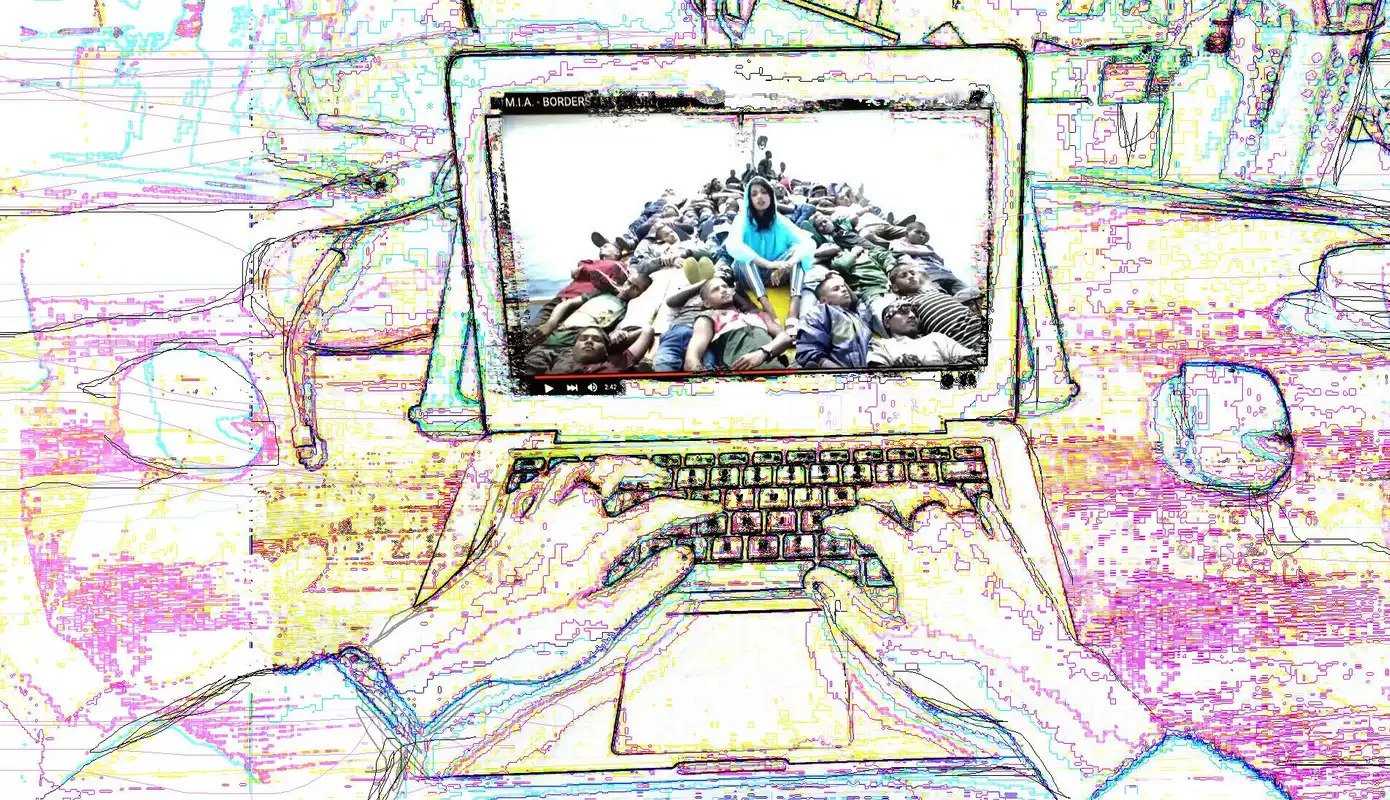I left America vowing not to come back. I was tired of being an angry brown grrl. Tired of trying to tell white administrators that the violence of white supremacy existed within the hallowed halls of the private liberal arts college I attended. I went home where I am angry about different things, but my brown-ness is unremarkable. I returned to friends who were not trying to collect me for dinner party talk about their “Malaysian friend”. But here I am again at 27, trying to milk white academia for time to write, sitting alone in my apartment in the Mid-West watching M.I.A’s Bring the Noize video. I’ve seen it before, but I’m finally the right kind of brown grrl. Not ashamed or self-conscious to be hybrid. M.I.A is not “Queen of The Terence Koh Loving Rave Kids” as Kat George writes dismissively. This is Matangi. The goddess those of us who have been pulled aside for “random” screenings at airports, teased for our accents and syntax, had our lunches made fun of at school, ashamed of our pottus and turbans have been waiting for our whole lives. M.I.A dressed all in white crouched beneath the most un-Zen Ohm transposed over a Yin-Yang is the queen of a world I didn’t even know I was homesick for. Welcome to World Town where we have the agency to liberate the symbols of the “exotic” from whatever spa Buddhism hell they’ve been confined to. Welcome to World Town where the lost fourteen year old me who needed M.I.A thirteen years ago can finally see that her coolness is not mitigated by being brown.
*
My relationship with my Indian half was always going to be fraught. The seeds for that were planted with my maternal grandfather, Aloysius Jerome Morris. Whose anglicized name (the legacy of rice distributing missionaries) obscures his hometown of fishing boats and coconut trees in Kerala, India. He was a city planner and trade unionist. A wearer of handlebar mustaches, who hated short men because of his own five feet nothing stature. In choosing my grandmother, who sat in their wedding pictures to disguise how much taller she was, my grandfather hoped to obliterate his genes. Later, her height would prove to be one of her few redeeming qualities. But he didn’t know that yet standing next to her in the photo studio. He in a light suit, she in a dress instead of the wedding sari he had brought from India. We are chatu people my great-grandfather told his new son-in-law when he offered up the sari. The same desire for progress that led him to choose a tall bride and feed his children a high protein diet extended to language. English is the future, he said. So, he forbid his children from speaking Malayalam at home. As a result, my mother is the shortest of her siblings at 5’ 5”, and can barely speak Malayalam. I was always going to do ballet and not Bharatanatyam as a kid.
*
Growing up in Malaysia, Indian is often a synonym for criminal. I have Indian friends who are proud they can’t speak Tamil. They’re not that kind of Indian. Just as I am half Indian. When my friends and I get drunk in parks late at night, or buy cheap whiskey from unlicensed shops run on the labour of migrants from India we joke about how we’re being karat like those Indians. The ones the Al Jazeera documentary Malaysia’s Gang Menace is about. But in America, Indian is only tangentially associated with violence. Like the time your white classmate said, India is a tech support guy who says his name is Paul, when you know it’s really jihad. No offense. More often than not, Indian is a punchline to the “Haha Indians and their accents” joke in America. Sometimes India is chill and exotic. Like that one time, Elizabeth Gilbert, the idol of all white girls seeking enlightenment between downward dogs, felt God in an ashram in India. This version of India, bucolic and spartan (but not poor), is the one girls (always girls) from my college want to study abroad in.
*
“For me to tell you things you need to be the right kind” – M.I.A, Lights.
*
Before I was an angry brown grrl I didn’t know what to do with M.I.A. I watched her Born Free video with disgust. “It’s about the civil war in Sri Lanka,” my Sri Lankan Tamil friend told me. But what does gunning down redheaded boys in an open field have anything to do with Sri Lanka? I didn’t know anything about Sri Lanka except that the girls at school who were Sri Lankan were categorized on forms as lain-lain, or other, like me. I hadn’t yet heard about the Sri Lankan civil war, or the shaky mobile phone videos of Tamil men killed by the Sri Lankan Army. I didn’t know yet that white pain always elicits thoughts and prayers more readily than brown pain.
*
At fourteen I am painfully aware that I am not cool. People say that I am pleasantly plump, which I know is a nice way to say fat. I have frizzy hair, big glasses I hate, and a forehead exploding with pimples. I try to avoid anything that would make me even uncooler. I haven’t worn a salwar kameez since I was four or five, and I’ve never worn a sari. I am not going to start now. I wouldn’t be caught dead wearing a pottu. But when I watch Gwen Stefani wearing one in the Don’t Speak music video I reconsider its possibilities as something cool. Maybe if I wore it with a chatu like she does, and not a sari or salwar kameez; and casually, not for something like Deepavali, then it would look cool.
*
Before I taped a sign that said ANGRY BROWN GRRL to my graduation cap in May 2013, I had organized a protest with friends. Our demands included mandatory sensitivity training for staff and faculty that stemmed from repeated instances of different professors allowing students who said bigoted things to go unchecked. I stayed calm when the college’s president said, “We have a diversity committee. Did you talk to them?” in response to our list of demands. I argued my point rationally, “We are protesting because this needs to be a conversation that is visible to the entire campus.” But on the day of my graduation I was done. I wanted the president, who would hand me my diploma, to know that her post-protest email promising policy changes, that I was sure would not translate into action, hadn’t placated me. I was still angry. However, even this small gesture was too much for my mother. She recoiled in horror when she saw my cap, “I’m browner than you!” My mother (who survived being called a Paki and asked if she lived in a tree in England in the 70s) does not understand what a micro-aggression is. With her statement of fact she seemed to ask, What more do you want? You will put this place on your CV to get good jobs and move up in the world. What does the rest matter? Yes, it’s true that she is browner than me. And, it’s true that I’m fair, and sometimes kind of white looking, and I have an Irish-Scottish great-great-grandfather. Does that mean I can’t be angry about the things that happened here? Like the person who wrote an anonymous LiveJournal post defending white supremacy that was slipped under the doors with names that didn’t sound white in my first year. Or the time someone wrote the n word on an African American girl’s whiteboard. And the college’s only response was to send an email to say racial epithets violated the school’s code of conduct. I don’t say anything, but I don’t take the sign off either.
*
In 2006, M.I.A, perhaps unsurprisingly, was denied a US work visa. In a post 9/11 world, her debut album unapologetically referenced guerrilla tactics, bombs, and the Palestine Liberation Organization. Things brown people who want to travel in the West should definitely not say out loud. Defiant, she wrote: “They won’t let me in! Now I’m strictly making my album outside the borders!!!!” on her MySpace page. The album she eventually made, Kala, doubles down on the themes and imagery that likely resulted in the denial of her work visa. In 2007 (the same year Kala was released), M.I.A wasn’t on my radar, but we were about to have something in common. That year I applied for a British working holiday visa so I could embark on the most British of things, a gap year. With my parents bank account statements and an aunt in England who would host me I thought that the interview was just a formality. But the immigration officer at the British High Commission who interviewed me concluded that I intended to travel to the UK for purposes other than a working holiday (prostitution? drug trafficking? overstaying?). I stood outside the British High Commission in Kuala Lumpur sobbing after the unexpected rejection. This was the first time that it dawned on me that white people saw me as some kind of threat despite my comfortable socio-economic background. My native English proficiency and A-levels were not enough to make up for the fact that I was also a young brown woman. A less desirable candidate for an extended stay visa than the young white Australians on working holidays I later met in London. It was the beginning of the realization that being the safe kind of brown is not enough to cross a border without scrutiny. I wouldn’t have cried that day. Maybe if I had listened to Kala then I would have been better prepared. I wouldn’t have given them the satisfaction of seeing me cry.
*
“I’m really proud of the fact that I had to go to court to come to England. And, I want English people to know that.” – Interview: MIA – I Want People To Know I Went To Court To Come To England (Part II)
*
I’m tired of being an angry brown grrl. But in choosing to return to white academia, it’s inevitable that I return to the work I left unfinished at my previous college. I know this, yet I’m still surprised every time it’s made clear to me that this place was not created with me in mind. To include me requires an effort that white academia is unwilling to undertake. Like the time I was told that I should take “Anglo-American literature” because I am here to study English literature. I’m too shocked and offended to say anything. Later, I think about what I should have said. Would you say that to Arundhati Roy? Chimamanda Ngozi Adichie? Does Toni Morrison count as canon? Is James Baldwin American enough?
*
If you are a politically conscious person of color you probably know that white people only like to have their racism (especially when they claim it’s unintentional) called out in a nice way. White people don’t like to deal with your anger when they fuck up. They want you to hold their hand through it. I used to argue with an ex-boyfriend about the right to be angry in these situations. He was bi- racial (like me), and had mostly white friends (that he admitted he couldn’t have honest conversations about race with). “Have you ever tried having drinks with someone, and approaching it in a friendly way?” I don’t know how to be gracious when calling out someone’s bigotry. But, for my own sanity I can’t be angry all the time.
*
White critics and journalists don’t know how to write about M.I.A. They either don’t credit her with intention and/or fail to take the context from which she comes from into account. It’s not a coincidence then that the two best articles I have found about M.I.A in writing this article were written by Anupa Mistry and Ayesha A. Siddiqi, women of color. I won’t pretend to know their individual experiences as women of color, but I can infer from their articles that M.I.A inspires them and they respect her, just as I do. And the respect with which they approach her work is reflected in their writing. This is not to say you can’t get M.I.A if you’re not brown. Spencer Kornhaber (a white dude!), takes M.I.A seriously too, and wrote a pretty good analysis of Borders, her latest single that has inevitably stirred up controversy as to its meaning and intention. Does it spotlight or exploit refugees? Why does M.I.A look glamorous while everyone else looks drab? At this point in the game M.I.A knows how her work is received. And she has no fucks left to give. Throughout the video she is nonchalant as she lists some of the most pressing issues of our time, and then asks, What’s up with that? Her lyrics paired with boats filled with brown men (presumably headed somewhere in the West) is every xenophobic white person’s worst nightmare. The combination of her deliberate shift in delivery, from rapid fire to almost impassive, and the disconcertingly beautiful images of refugees scaling fences and forming a ship is calculated to unsettle. M.I.A has mastered her anger. She is past the point of caring if you engage. But the option is there.




